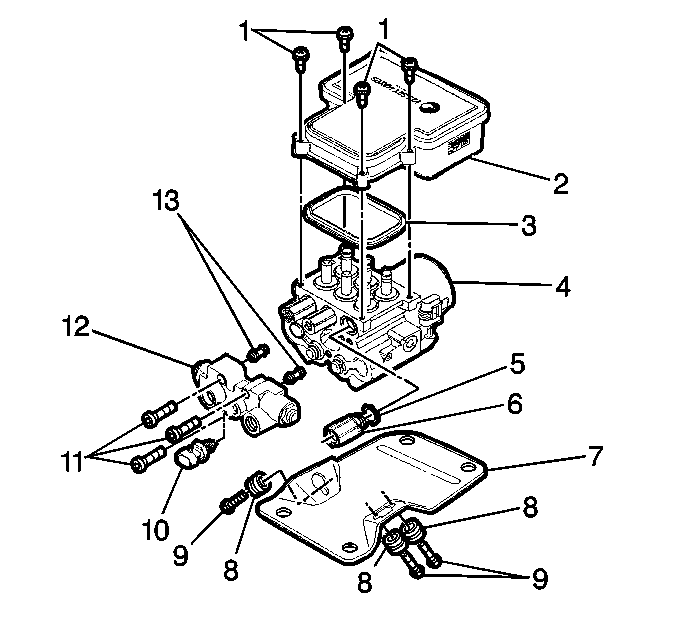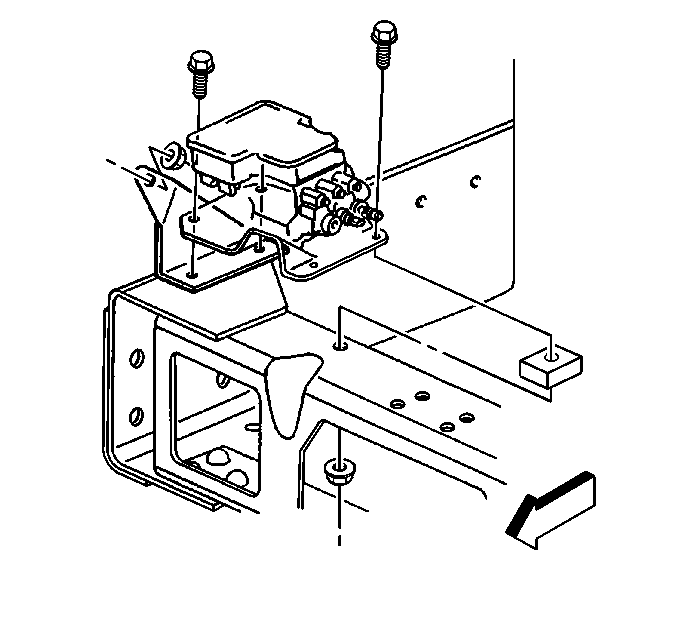Removal Procedure
- Negative Battery Cable. Refer to
Caution: Unless directed otherwise, the ignition and start switch must be in the OFF or LOCK position, and all electrical loads must be OFF before servicing any electrical component. Disconnect the negative battery cable to prevent an electrical spark should a tool or equipment come in contact with an exposed electrical terminal. Failure to follow these precautions may result in personal injury and/or damage to the vehicle or its components.
. - Remove the three EBCM electrical connectors.
- Remove the combination valve electrical connector.
- Remove the five brake lines from the BPMV.
- Remove the BPMV pump motor electrical connector from the EBCM.
- Remove the four T-25 Torx® bolts (1) that fasten the EBCM to the BPMV.
- Remove the EBCM (2) from the BPMV (4) Removal may require a light amount of force.
- Remove the three allen bolts (11) which fasten the combination valve to the BPMV.
- Remove the combination valve from the BPMV.
- Remove the two transfer tubes (13).
- Remove the three tube adapters (6).
- Remove the three BPMV mounting bracket bolts (9).
- Remove the BPMV (4) from the EHCU mounting bracket (7).
- Clean the BPMV (4) with a clean, dry cloth.

Important: Do not use a tool to pry the EBCM from the BPMV. Excessive force will damage the EBCM.
Important: Do not reuse the transfer tubes. Always install new transfer tubes when replacing the BPMV.
Installation Procedure
Important: Do not reuse the EBCM mounting bolts. Always install new EBCM mounting bolts with the new EBCM.
Notice: Use the correct fastener in the correct location. Replacement fasteners must be the correct part number for that application. Fasteners requiring replacement or fasteners requiring the use of thread locking compound or sealant are identified in the service procedure. Do not use paints, lubricants, or corrosion inhibitors on fasteners or fastener joint surfaces unless specified. These coatings affect fastener torque and joint clamping force and may damage the fastener. Use the correct tightening sequence and specifications when installing fasteners in order to avoid damage to parts and systems.
- Install the BPMV (4) onto the EHCU (7) mounting bracket.
- Install the three tube adapters (6)
- Install two new transfer tubes (13) into the combination valve (12).
- Install the combination valve (12) onto the BPMV (4).
- Install the three combination valve fastening bolts (11).
- Install EBCM (2) to BPMV (4).
- Install the four new EBCM bolts (1).
- Install the BPMV pump motor electrical connector to the EBCM.
- Install the EHCU to vehicle.
- Connect the three electrical connectors to the EBCM.
- Connect the five brake lines to the combination valve.
- Connect the negative battery cable.
- Bleed the brake system. Refer to Antilock Brake System Automated Bleed Procedure
- Return to Diagnostic System Check .
Tighten
Tighten the three BPMV mounting mounting bolts (9) to 9 N·m(7l lb ft).

Tighten
Tighten the tube adapters to 31 N·m (23 lb ft).
Important: Do not reuse the transfer tubes (13). Always install new transfer tubes when removing the combination valve (12).
Tighten
Tighten the three allen bolts first to 8 N·m (6 lb ft)
and then to 12 N·m (12 lb ft).
Tighten
Tighten the four bolts to 5 N·m (39 lb in)
in an X-pattern.

Tighten
Tighten the five brake lines to 30 N·m (22 lb ft).
